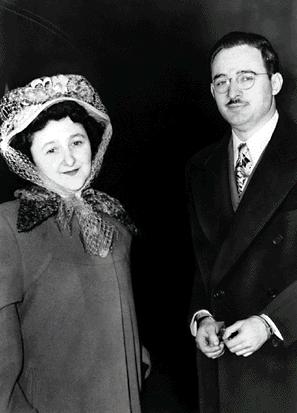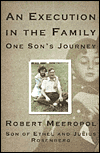 The Truth about the Rosenbergs
The Truth about the Rosenbergs
Robert Meeropol,
An Execution in the Family
St. Martin's Press, 2003

In February and March of last year, as the war on Iraq loomed larger and larger, the broad antiwar coalition of 'old left' hardliners, 'new left' activists, and mainstream skeptics really came into their own. March's protest in London - where I live - was the largest ever political demonstration in the UK (see related article), but it was as impressive for its passionately held and expressed message as it was for its strength of numbers. Yet it was precisely this confidence that I found most off-putting. I'm sure there were others, just as unsure about the issues, who had no qualms about identifying with such a movement; but, for me, it felt too alienating to be part of something presenting a public front that seemed so certain. My relationship with the war-apologists was no different. They were less vocal - I heard claims they were the "silent majority" - but I had too many objections to swallow their arguments whole either. So I agreed with neither the articles in the press saying 'we should be going to war' nor, conversely, those saying 'stop this madness now' but rather with the columnists who said 'I would be with the anti-war movement, but …' In a war marked by overly certain rhetoric on the part of the US and Iraq, the forthright certainty or moral simplicity of both the pros and the antis seemed to me distasteful.
Fifty years ago, Ethel and Julius Rosenberg were executed by the United States government for conspiracy to commit espionage, when their son Robert Rosenberg (now Meeropol) was just six years old. Their execution took place in 1953, but the case still attracts enormous fascination today. But not only fascination - opinion as well. The Rosenbergs became for many a cause célèbre, a kind of test case used to show the evils of McCarthyism. Most of their supporters people believed, or wanted to believe, that the couple had been innocent. Conversely, those on the other side were certain that Ethel and Julius had given atomic secrets to the KGB.
Now having read Robert Meeropol's memoirs, An Execution in the Family, heard his nuanced analysis of his parents' case, and turned to the chorus of journalistic and academic voices on the Internet who rush to pronounce the Rosenbergs definitively guilty, I get the same feeling as I did with the anti-war debate. When people are so sure, surely they're not seeing the whole picture.
I don't mean to proclaim the Rosenbergs framed heroes; I wouldn't want to be accused of being the latest dupe of what Jacob Weisberg has called "the left's creation science" ('Cold War Without End', New York Times Magazine, November 28, 1999). According to Hayden B Peake, former military intelligence and CIA expert on both Soviet and American intelligence, it is impossible for any sensible person "to avoid concluding that Julius Rosenberg was guilty of espionage."
But Hayden Peake is wrong, in that there are many sensible people who have acquainted themselves with the supposedly clinching evidence and avoided that very conclusion. Among them is Meeropol. But perhaps surprisingly, Meeropol does not cling to his parents' innocence either. In fact An Execution in the Family can be read as a 270 page argument for agnosticism and, vitally, the chronicle of a journey towards a form of political activism that can be based on not facts but doubt.
One thing that An Execution in the Family does is show us the development (or a version of the development) of Robert Meeropol's life and attitudes, including his stance towards his parents and the case. According to this depiction, his first position was one of righteous certainty. When in his late teens he read Walter and Miriam Schneir's Invitation to an Inquest (New York: Doubleday, 1965), he writes, "my emotional belief in my parents' innocence became an intellectual certainty." (67) Yet Meeropol, who took the name of Anne and Abel Meeropol, left-wing activists who adopted him and his brother, kept his identity a secret until 1973, when he felt forced by a possible breach of copyright on his parents' letters to reveal himself. When he did, he took a similarly sure stance. He describes how he started traveling around the country to campuses and audiences of potential donors, laying out what he believed were 'the facts of the case', showing why the key pieces of evidence against the Rosenbergs should all have been inadmissible.
Yet it is clear from An Execution that over the course of his life Robert Meeropol has become less certain. He explicitly acknowledges the change:
| The press regularly asked me if I sought my parents' vindication. Although I'd answered that question affirmatively in the 1970s, by the 1990s I was saying no. My goal was to force both the American and Russian governments to release all their secret files and let the chips fall where they may. (202) |



Harvard Death Fugue
On the Exploitation of Bruno Schulz
James Russell
The Jews of Istanbul
Sara Liss
The Truth about the Rosenbergs
Joel Stanley
Thinking despite Doubt, Feeling despite Truth
Jay Michaelson
Two Rituals
Joshua Bolton
Hepster Advice
Jennifer Blowdryer
Josh Goes to the Hospital
Josh Ring
Archive
Our 400 Back Pages
Saddies
David Stromberg
Zeek in Print
Winter 03 issue now on sale
About Zeek
Events
Contact Us
Links
From previous issues:
The Red-Green Alliance
Dave Hyde
I hear America Bling-blinging
Jay Michaelson
Radical Evil
Michael Shurkin